
The Falklands War was a ten-week undeclared war between Argentina and the United Kingdom in 1982 over two British dependent territories in the South Atlantic: the Falkland Islands and its territorial dependency, South Georgia and the South Sandwich Islands.
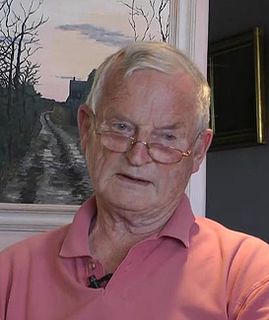
Admiral Sir John Forster "Sandy" Woodward, was a senior Royal Navy officer who commanded the Task Force of the Falklands War.

Margaret Hilda Thatcher, Baroness Thatcher, was Prime Minister of the United Kingdom from 1979 to 1990 and Leader of the Conservative Party from 1975 to 1990. She was the first female British prime minister and the longest-serving British prime minister of the 20th century. As prime minister, she implemented economic policies that became known as Thatcherism. A Soviet journalist dubbed her the "Iron Lady", a nickname that became associated with her uncompromising politics and leadership style.

ARAGeneral Belgrano (C-4) was an Argentine Navy light cruiser in service from 1951 until 1982. Originally commissioned by the U.S. as USS Phoenix, she saw action in the Pacific theatre of World War II before being sold by the United States to Argentina. The vessel was the second to have been named after the Argentine founding father Manuel Belgrano (1770–1820). The first vessel was a 7,069-ton armoured cruiser completed in 1896.
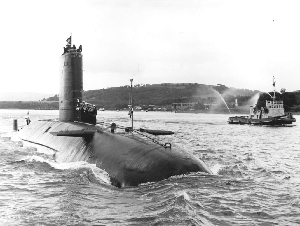
HMS Conqueror was a British Churchill-class nuclear-powered fleet submarine which served in the Royal Navy from 1971 to 1990. She was the third submarine of her class, following the earlier Churchill and Courageous, that were all designed to face the Soviet threat at sea. She was built by Cammell Laird at Birkenhead.
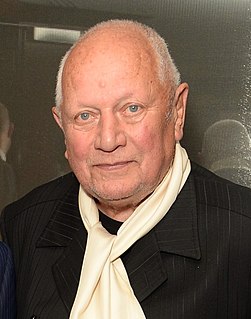
Steven Berkoff is an English actor, author, playwright, theatre practitioner and theatre director.
Clive Sheridan Ponting was a senior British civil servant and historian. He was best known for leaking documents about the sinking of the ARA General Belgrano in the Falklands War in 1982. At the time of his resignation from the civil service in 1985, he was a Grade 5, earning £23,000 per year.

Nationwide was a BBC current affairs television programme which ran from 9 September 1969 until 5 August 1983. Originally broadcast on BBC 1 from Tuesday to Thursday, and then each weekday from 1972, it followed the early evening news, and included the regional opt-out news programmes.

The Falklands Play is a dramatic account of the political events leading up to, and including, the 1982 Falklands War. The play was written by Ian Curteis, an experienced writer who had started his television career in drama, but had increasingly come to specialise in dramatic reconstructions of history. It was originally commissioned by the BBC in 1983, for production and broadcast in 1986, but was subsequently shelved by Controller of BBC One Michael Grade due to its pro-Margaret Thatcher stance and alleged jingoistic tone. This prompted a press furore over media bias and censorship. The play was not staged until 2002, when it was broadcast in separate adaptations on BBC Television and Radio. It was aired again on BBC4, 1 December 2020, over 18 years after it was last transmitted.
The cultural impact of the Falklands War spanned several media in both Britain and Argentina. A number of films and television productions emerged from the conflict. The first Argentine film about the war was Los chicos de la guerra in 1984. The BBC drama Tumbledown (1988) tells the story of a British officer paralysed from a bullet wound. The computer game Harrier Attack (1983) and the naval strategy game Strike Fleet (1987) are two examples of Falklands-related games. A number of fictional works were set during the Falklands War, including in Stephen King's novella The Langoliers (1990), in which the character Nick Hopewell is a Falklands veteran. The war provided a wealth of material for non-fiction writers; in the United Kingdom (UK) an important account became Max Hastings and Simon Jenkins' The Battle for the Falklands.
There were many events leading to the 1982 Falklands War between the United Kingdom and Argentina over possession of the Falkland Islands and South Georgia.

Margaret Thatcher was Prime Minister of the United Kingdom from 1979 to 1990. Her portrayal in the arts and popular culture has been mixed. In the words of one critic she attracted "musical opprobrium like no other British political leader". Such opinion is divergent from mainstream opinion polling which tends to place her as the most popular British prime minister since Winston Churchill.
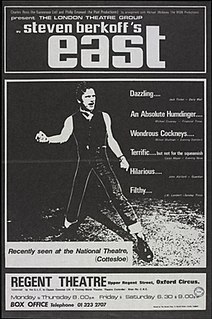
East is a 1975 verse play by Steven Berkoff, dealing with growing up and rites of passage in London's rough East End.
Greek is an opera in two acts composed by Mark-Anthony Turnage to a libretto adapted by Turnage and Jonathan Moore from Steven Berkoff's 1980 verse play Greek. The play and the opera are a re-telling of Sophocles's Greek tragedy Oedipus Rex with the setting changed to the East End of London in the 1980s. The opera was first performed on 17 June 1988 in the Carl-Orff-Saal of the Gasteig, Munich, in a co-production by the Munich Biennale, the Edinburgh International Festival and the BBC.
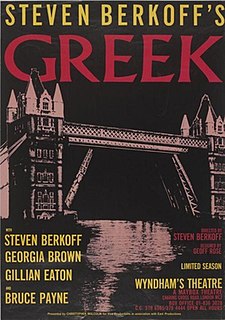
Greek is a verse play by Steven Berkoff. It was first performed at The Half Moon Theatre, London on 11 February 1980. It is a retelling of Sophocles' Oedipus Rex. Berkoff wrote:
"Greek came to me via Sophocles, trickling its way down the millennia until it reached the unimaginable wastelands of Tufnell Park ... In my eyes, Britain seemed to have become a gradually decaying island, preyed upon by the wandering hordes who saw no future for themselves in a society which had few ideals or messages to offer them."

The Iron Lady is a 2011 biographical drama film based on the life and career of Margaret Thatcher, a British politician who was the longest-serving Prime Minister of the United Kingdom of the 20th century and the first woman to hold the office. The film was directed by Phyllida Lloyd and written by Abi Morgan. Thatcher is portrayed primarily by Meryl Streep, and, in her formative and early political years, by Alexandra Roach. Thatcher's husband, Denis Thatcher, is portrayed by Jim Broadbent, and by Harry Lloyd as the younger Denis. Thatcher's longest-serving cabinet member and eventual deputy, Geoffrey Howe, is portrayed by Anthony Head.
Christopher Louis Wreford-Brown DSO RN is a retired British Royal Navy officer.
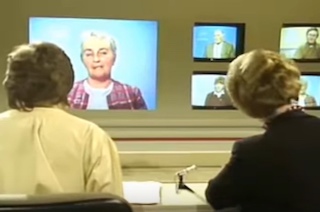
An exchange on 24 May 1983 between Diana Gould, an English schoolteacher and former Women's Royal Naval Service meteorological officer, and British prime minister Margaret Thatcher was voted in 1999 as one of Britain's most memorable television spots. Appearing as a member of the public on BBC Nationwide's On the Spot live election special, Gould confronted Thatcher over the sinking of the Belgrano, an Argentine warship, during the 1982 Falklands War between the United Kingdom and Argentina.

At 10:15 pm (BST) on the night of 14 June 1982, British prime minister Margaret Thatcher announced to the House of Commons that negotiations had begun for the surrender of the Argentine invasion force in the Falkland Islands, ending the Falklands War. Her statement noted that "they are reported to be flying white flags over Port Stanley", the capital of the Falklands. This was based on an erroneous report from a front-line unit; in fact, no white flags are known to have been flown, though Argentine resistance ended and a ceasefire was in place. The surrender was finalised by 1:30 am BST on 15 June. Thatcher's statement was welcomed from all sides in the House, and she left to join celebrating crowds in Downing Street. She later described the statement as "perhaps the proudest moment of my life".














